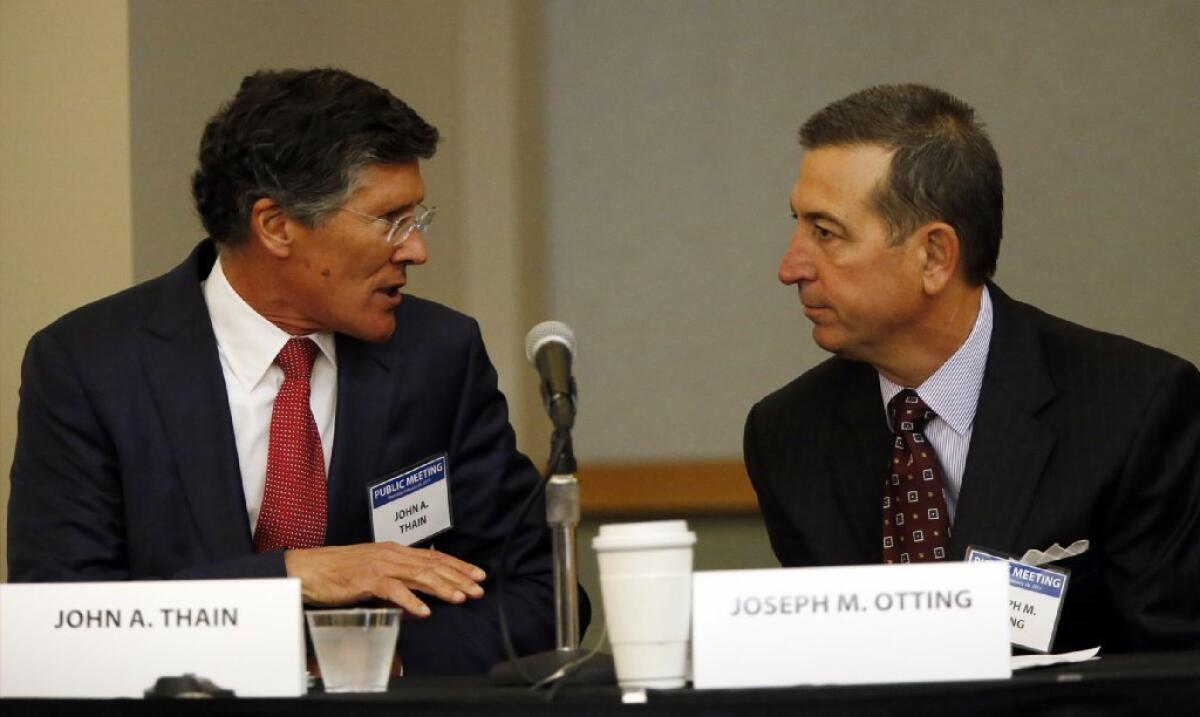Banking regulators OK merger of OneWest with CIT Group

Bank regulators have approved CIT Group’s takeover of OneWest Bank in Pasadena. Above, CIT Chief Executive John Thain and Onewest CEO Joseph Otting appeared at a Federal Reserve hearing on the merger in February.
- Share via
Federal regulators approved a New York lender’s controversial $3.4-billion takeover of Pasadena’s OneWest Bank, a deal that would create a hybrid company with a national commercial lending business and 70 retail branches in Southern California.
The decision, announced Tuesday, overcame objections that the deal with CIT Group Inc. would create another too-big-to-fail bank and that the combined operation wouldn’t serve the needs of its poorer and minority neighbors.
The approval also marks a triumph for an investor group that includes billionaire computer entrepreneur Michael Dell and hedge fund operators George Soros and John Paulson.
The group was led by Steven Mnuchin, another hedge fund operator and executive producer of such films as “The Lego Movie,” “American Sniper” and “Mad Max: Fury Road.”
Outbidding other prominent suitors, the investors created OneWest in the depths of the Great Recession from the remains of IndyMac Bancorp in Pasadena, which regulators seized in 2008 and sold. It had been spun off earlier from Countrywide Financial Corp., the notorious Calabasas mortgage giant acquired by Bank of America Corp.
IndyMac, a specialist in mortgages made without verifying borrower incomes, had become an international emblem for the loose lending that triggered the global crisis in real estate and mortgage securities.
In their deal with the Federal Deposit Insurance Corp., the investors agreed to inject $1.5 billion in new capital into OneWest, with the FDIC shouldering most of the losses on IndyMac’s loans. Since then, the bank has paid more than $3.5 billion in dividends, filings with bank regulators show.
“The guys who put the money in that thing have to be very, very pleased,” said Bert Ely, a longtime bank consultant in Alexandria, Va.
The proposed merger, for $2 billion in cash and $1.4 billion in stock, was announced a year ago.
It is one of a series of blockbuster deals involving Southern California banking firms. Most notably, longtime Los Angeles stalwart City National Corp. is awaiting approval of its $5.4-billion acquisition by the Royal Bank of Canada.
The OneWest-CIT deal touched off intense debate over its public benefits, and regulators took public testimony in Los Angeles in February from supporters and opponents.
John Thain and Joseph Otting, the chief executives of CIT and OneWest, respectively, defended the deal and promised that it would benefit low-income areas by delivering $5 billion in loans and other support over four years.
But some witnesses challenged them over whether the merged bank, big enough to be deemed systemically important to the financial system, would fulfill its legal obligation to serve the poor in Southern California.
One advocacy group, the California Reinvestment Coalition, called the $5-billion pledge inadequate and vague. The coalition also questioned the stability of CIT, which filed for bankruptcy after receiving a federal bailout in 2009 and, thus, avoided repaying nearly $2.3 billion in taxpayer assistance.
The coalition’s executive director, Paulina Gonzalez, complained Tuesday that the approvals by the Federal Reserve and the Office of the Comptroller of the Currency did not spell out how the comptroller would judge the bank’s commitment to satisfying the Community Reinvestment Act, which requires banks to support all segments of their communities.
In approving the deal, regulators did require the merged bank to submit a business plan in 120 days and a detailed CRA plan in 90 days.
Gonzalez said that although the comptroller took a good step in making the plans public, the regulator “has not made public any standards by which it is going to evaluate the bank’s CRA plan or its comprehensive business plan.”
“It’s not transparent,” she said. “It’s like a bank approving a loan with very little underwriting,” the basic evaluation of the risks.
Faith Bautista, head of the National Asian American Coalition, an advocacy group that supported the deal, said the approval was “the best news” for her group’s members.
“More people will be helped,” she said, “homeowners, micro-businesses and small minority businesses.”
The combined company will be based in New York with Thain as chairman and chief executive and Mnuchin as executive vice chairman. CIT’s Internet banking arm, based in Utah, will be merged into OneWest and called CIT Bank. It will be based in Pasadena with Otting as chief executive.
In a statement late Tuesday, CIT said it expected the deal to close Aug. 3.
“We welcome OneWest employees to CIT and we look forward to working with them to meet the needs of small and middle market businesses, the transportation industry, real estate sector and our retail bank customers,” Thain said.
OneWest’s parent company, IMB Holdco, has $21.8 billion in assets and $14.1 billion in deposits, the Federal Reserve said. CIT Group has $47.9 billion in assets and $15.9 billion in deposits.
The combined company would be the 41st-largest bank in the country with federally insured deposits, the Fed said.
A spokesman for OneWest declined to comment.
More to Read
Inside the business of entertainment
The Wide Shot brings you news, analysis and insights on everything from streaming wars to production — and what it all means for the future.
You may occasionally receive promotional content from the Los Angeles Times.











